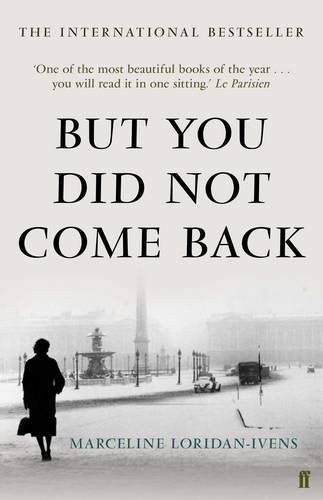Marceline Loridan-Ivens, But You Did Not Come: 'Love and guilt amid the horrors of the Holocaust', book review
Marceline’s deeply moving account is written in the form of a letter to her father, who was arrested with her in France in 1943

Your support helps us to tell the story
From reproductive rights to climate change to Big Tech, The Independent is on the ground when the story is developing. Whether it's investigating the financials of Elon Musk's pro-Trump PAC or producing our latest documentary, 'The A Word', which shines a light on the American women fighting for reproductive rights, we know how important it is to parse out the facts from the messaging.
At such a critical moment in US history, we need reporters on the ground. Your donation allows us to keep sending journalists to speak to both sides of the story.
The Independent is trusted by Americans across the entire political spectrum. And unlike many other quality news outlets, we choose not to lock Americans out of our reporting and analysis with paywalls. We believe quality journalism should be available to everyone, paid for by those who can afford it.
Your support makes all the difference.Writing about the trial of one of the major architects of the Holocaust, Adolf Eichmann, in 1961, Hannah Arendt coined the phrase “the banality of evil” to describe the systematic, unexamined way this genocide was enacted. The conversion of the barbaric to the everyday is expressed potently in two words in this memoir by the writer and documentary maker Marceline Loridan-Ivens.
Describing the arrival of hundreds of thousands of Hungarians at Birkenau, where she had been incarcerated since shortly after her sixteenth birthday, Marceline observes: “They undressed them, sent them to the gas chamber – the children, babies, and old people first, as usual.” It is this “as usual” that conveys the chilling way mass murder had become normal, even mundane.
Marceline’s deeply moving account is written in the form of a letter to her father, who was arrested with her in France in 1943. He was a Polish Jew immigrant, France had never granted him citizenship, and it was French police who arrested them. This betrayal of her father by the nationals of the country he loved was painful.
Of course, many other traumas superseded this. The main one was that her father never returned from Auschwitz, where he was sent. This loss haunted Marceline for the rest of her life, and broke the family. Marceline’s younger brother, who had been inseparable from his father before the arrest, developed bipolar illness and killed himself.
Marceline’s mother died shortly afterwards, and Marceline’s sister killed herself.
The death camps are evoked in their full horror. The constant stench of burning flesh, the howling of the dogs, the immediate killing of those deemed unsuitable for slave labour, the slow death from starvation or sickness of others, the brutal battering if they collapsed, the lice and typhus, the crowded cells, the deadening of emotion, and the shooting of those who attempted to escape.
Marceline received a letter from her father, smuggled in to her. It addressed her as “my darling little girl”. She tries for the rest of her life to remember the contents of the letter, but is unable to do so.
Her work detail comes across his one day, and they run to embrace each other, for which they are severely beaten. He manages to slip her a tomato and an onion.
For the rest of her days, Marceline longs for her father. She suffers survivors’ guilt. Her mother doesn’t understand, is obsessed with petty bourgeois concerns such as whether her daughter is still a respectable virgin, and urges her to forget, as if memories can be switched off. Marceline even attempts suicide.
Thankfully she eventually finds joy and fulfilment in her second marriage, to the famous film-maker and activist Joris Ivens. She is aware that anti-Semitism “is an eternal given”, and observes Europe’s suspicion of Israel.
This is a haunting and beautiful book, valuable not only for the first-hand experience of the worst atrocity in living history, but also for its illustration of the long-term effects of trauma, the persistence of anti-Semitism and the enduring power of love.
But You Did Not Come Back, by Marceline Loridan-Ivens with Judith Perrignon (Trs by Sandra Smith). Faber & Faber £12.99
Join our commenting forum
Join thought-provoking conversations, follow other Independent readers and see their replies
Comments